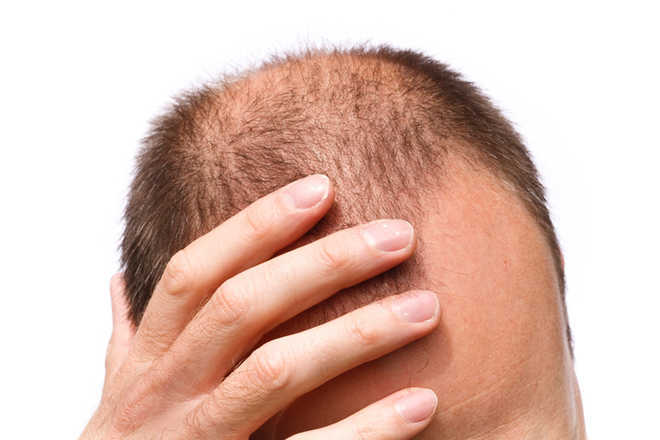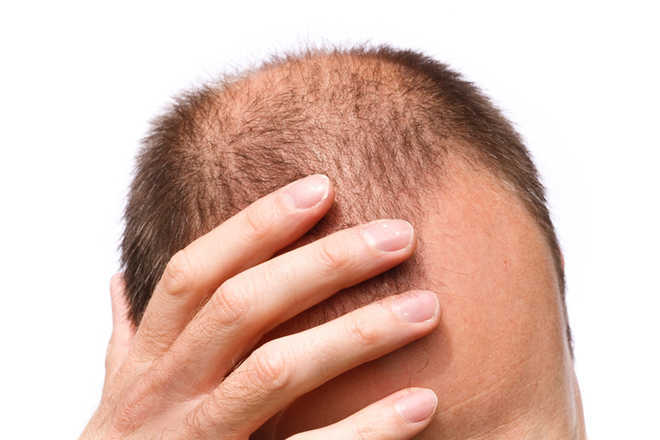 Scientists, including one of Indian-origin, have developed a drug that successfully reversed hair loss, hair whitening and skin inflammation in mice, and may pave the way for new therapies in humans.The compound halts the production of certain fats called glycosphingolipids (GSLs) that are major components of skin and other cell membranes.Current research shows that mice fed a diet high in fat and cholesterol are more likely to have hair discoloration from black to grey to white, extensive hair loss and inflammation of skin exhibited by multiple wounds.Feeding these animals the compound, however, appears to reverse such symptoms.The researchers from Johns Hopkins University in the US caution that such results in mice do not mean that the same effects would occur in people, and there is no evidence at this time that the compounds they used would be safe in people.However, the findings, published in the journal Scientific Reports, shed light on possible pathways for addressing hair loss and skin wounds in humans with oral or topical medications.“Further research is needed, but our findings show promise for someday using the drug we developed for skin diseases such as psoriasis, and wounds resulting from diabetes or plastic surgery,” said Subroto Chatterjee, a professor at the Johns Hopkins University.More specifically, previous studies showed that GSLs are prevalent in the cells that make up the uppermost layer of the skin, as well as in cells called keratinocytes that help regulate pigmentation of the eyes, skin and hair.Researchers wanted to determine how disrupting GSLs might affect skin appearance and colour, and whether treatment with D-threo-1-phenyl-2-decanoylamino-3-morpholino-1-propanol (D-PDMP) – a human-made compound that halts GSL production – would reverse any negative effects.They first genetically modified a group of mice to have atherosclerosis, a disease in which arteries are clogged by fat deposits.The researchers then fed one group of these mice a Western diet high in fat and cholesterol, and a second group standard chow. All mice were fed their assigned diets from 12 weeks of age to 20 weeks.Compared to those fed standard chow, the mice that ate a Western diet lost hair, formed skin lesions and suffered from hair whitening.Treatment with 1 milligram of D-PDMP in a capsule per kilogram of body weight was as effective as 10 milligrams per kilogram as a liquid. This suggests that an encapsulated form of D-PDMP is a better method of drug delivery.The research team then looked at the skin of the mice’s under a microscope and found that mice eating the Western diet experienced an infiltration of neutrophils, a type of white blood cell implicated in inflammation, in various skin areas.Treatment with D-PDMP in a capsule significantly reduced the number of neutrophils, implying reduced skin inflammation and wounding.“Our findings show that a Western diet causes hair loss, hair whitening and skin inflammation in mice, and we believe a similar process occurs in men who lose hair and experience hair whitening when they eat a diet high in fat and cholesterol,” said Chatterjee.
Scientists, including one of Indian-origin, have developed a drug that successfully reversed hair loss, hair whitening and skin inflammation in mice, and may pave the way for new therapies in humans.The compound halts the production of certain fats called glycosphingolipids (GSLs) that are major components of skin and other cell membranes.Current research shows that mice fed a diet high in fat and cholesterol are more likely to have hair discoloration from black to grey to white, extensive hair loss and inflammation of skin exhibited by multiple wounds.Feeding these animals the compound, however, appears to reverse such symptoms.The researchers from Johns Hopkins University in the US caution that such results in mice do not mean that the same effects would occur in people, and there is no evidence at this time that the compounds they used would be safe in people.However, the findings, published in the journal Scientific Reports, shed light on possible pathways for addressing hair loss and skin wounds in humans with oral or topical medications.“Further research is needed, but our findings show promise for someday using the drug we developed for skin diseases such as psoriasis, and wounds resulting from diabetes or plastic surgery,” said Subroto Chatterjee, a professor at the Johns Hopkins University.More specifically, previous studies showed that GSLs are prevalent in the cells that make up the uppermost layer of the skin, as well as in cells called keratinocytes that help regulate pigmentation of the eyes, skin and hair.Researchers wanted to determine how disrupting GSLs might affect skin appearance and colour, and whether treatment with D-threo-1-phenyl-2-decanoylamino-3-morpholino-1-propanol (D-PDMP) – a human-made compound that halts GSL production – would reverse any negative effects.They first genetically modified a group of mice to have atherosclerosis, a disease in which arteries are clogged by fat deposits.The researchers then fed one group of these mice a Western diet high in fat and cholesterol, and a second group standard chow. All mice were fed their assigned diets from 12 weeks of age to 20 weeks.Compared to those fed standard chow, the mice that ate a Western diet lost hair, formed skin lesions and suffered from hair whitening.Treatment with 1 milligram of D-PDMP in a capsule per kilogram of body weight was as effective as 10 milligrams per kilogram as a liquid. This suggests that an encapsulated form of D-PDMP is a better method of drug delivery.The research team then looked at the skin of the mice’s under a microscope and found that mice eating the Western diet experienced an infiltration of neutrophils, a type of white blood cell implicated in inflammation, in various skin areas.Treatment with D-PDMP in a capsule significantly reduced the number of neutrophils, implying reduced skin inflammation and wounding.“Our findings show that a Western diet causes hair loss, hair whitening and skin inflammation in mice, and we believe a similar process occurs in men who lose hair and experience hair whitening when they eat a diet high in fat and cholesterol,” said Chatterjee.
source:-tribuneindia.
